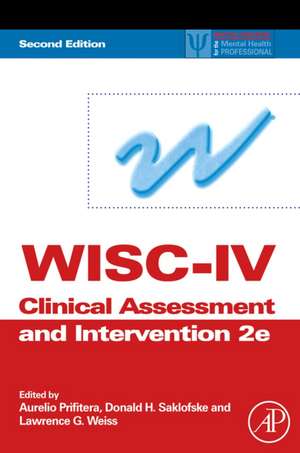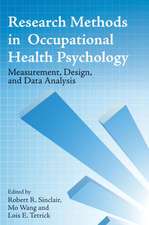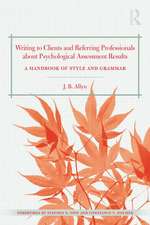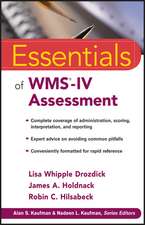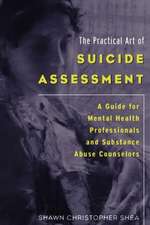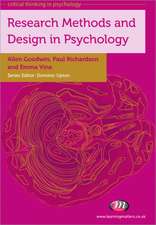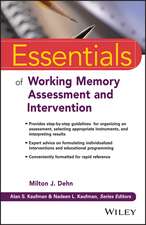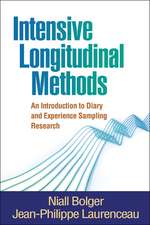WISC-IV Clinical Assessment and Intervention
Editat de Aurelio Prifitera, Donald H. Saklofske, Lawrence G. Weissen Limba Engleză Hardback – 7 aug 2008
- Inclusion of case studies illustrating the clinical applications of the WISC-IV in assessment and program planning
- Intervention recommendations following from assessment to diagnosis
- Introductory chapter illustrating the relationships between the WISC-IV index scores and intervention planning
- New chapters on Learning Disabilities, emotionally disturbed children, systematic illness, and Autism Spectrum Disorders
- Specialized chapters on neuropsychological applications, executive functioning, and cultural issues
- Additional information to aid test interpretation including extended norms for gifted children and the Cognitive Proficiency Index
- All chapters revised to reflect data obtained from the test in clinical use
Preț: 564.72 lei
Nou
Puncte Express: 847
Preț estimativ în valută:
108.06€ • 113.11$ • 89.94£
108.06€ • 113.11$ • 89.94£
Carte tipărită la comandă
Livrare economică 31 martie-14 aprilie
Preluare comenzi: 021 569.72.76
Specificații
ISBN-13: 9780123736260
ISBN-10: 0123736269
Pagini: 600
Ilustrații: Illustrations
Dimensiuni: 152 x 229 x 43 mm
Greutate: 1.02 kg
Ediția:2 Rev ed.
Editura: Elsevier
ISBN-10: 0123736269
Pagini: 600
Ilustrații: Illustrations
Dimensiuni: 152 x 229 x 43 mm
Greutate: 1.02 kg
Ediția:2 Rev ed.
Editura: Elsevier
Public țintă
School and child clinical psychologists, allied professionals such as special education teachers and psychiatrists who use the results of the WISC-IVCuprins
Part 1 Interfacing WISC-IV Assessment and Intervention: Foundations for Practice
1. Interpretation and Intervention with WISC-IV in the Clinical Assessment Context
Part 2 Interfacing WISC-IV Assessment and Intervention: Clinical Applications
2. Research-Supported Differential Diagnosis of Specific Learning Disabilities and Implications for Instruction and
3. WISC-IV Interpretation for Specific Learning Disabilities Identification and Intervention: A Cognitive Hypothesis Testing Approach
4. Language Disabilities
5. Attention-Deficit/Hyperactivity Disorder: Using the WISC-IV to Inform Intervention Planning
6. The Use of the WISC-IV in Assessment and Intervention Planning for Children Who are Gifted
7. Assessment of Mental Retardation/Intellectual Disability with the WISC-IV
8. Autism Spectrum Disorders: WISC-IV Applications for Clinical Assessment and Intervention
9. Assessment of Children with Emotional Disturbance Using the WISC-IV
10. The Cognitive Impact of Systemic Illness in Childhood and Adolescence
11. Considerations in Using the WISC-IV with Hispanic Children
Part 3 Interfacing WISC-IV Assessment and Intervention: Some Further Considerations
12. Neuropsychological Applications of the WISC-IV and WISC-IV Integrated
13. Extending the WISC-IV: Executive Functioning
14. Cultural Issues in Clinical Use of the WISC-IV
15. Of What Value is Intelligence?
1. Interpretation and Intervention with WISC-IV in the Clinical Assessment Context
Part 2 Interfacing WISC-IV Assessment and Intervention: Clinical Applications
2. Research-Supported Differential Diagnosis of Specific Learning Disabilities and Implications for Instruction and
3. WISC-IV Interpretation for Specific Learning Disabilities Identification and Intervention: A Cognitive Hypothesis Testing Approach
4. Language Disabilities
5. Attention-Deficit/Hyperactivity Disorder: Using the WISC-IV to Inform Intervention Planning
6. The Use of the WISC-IV in Assessment and Intervention Planning for Children Who are Gifted
7. Assessment of Mental Retardation/Intellectual Disability with the WISC-IV
8. Autism Spectrum Disorders: WISC-IV Applications for Clinical Assessment and Intervention
9. Assessment of Children with Emotional Disturbance Using the WISC-IV
10. The Cognitive Impact of Systemic Illness in Childhood and Adolescence
11. Considerations in Using the WISC-IV with Hispanic Children
Part 3 Interfacing WISC-IV Assessment and Intervention: Some Further Considerations
12. Neuropsychological Applications of the WISC-IV and WISC-IV Integrated
13. Extending the WISC-IV: Executive Functioning
14. Cultural Issues in Clinical Use of the WISC-IV
15. Of What Value is Intelligence?
Recenzii
"This edited volume is intended as a resource for both graduate instructors and practitioners who use the Wechsler Intelligence Scale for Children-IV (WISC-IV) as a tool for clinical assessment, diagnosis, and the development of psychoeducational interventions for a variety of disability categories. With a clear scientist-practitioner perspective and a focus on data interpretation and integration, it is a welcome addition to any professional library, particularly for practitioners who frequently use the WISC-IV as an assessment tool... Taken as a whole, the content and organization of this book makes the information easily accessible and very relevant for clinicians who use the WISC-IV as one of their assessment tools." --Journal of Psychological Assessment, 2010
Praise for previous editions:
"...the book is an excellent resource to assist practitioners to move beyond the mechanics of testing into the clinical enterprise of assessment. It would be a welcome addition to the bookshelf of practitioners at any stage of their career providing novices with direct instruction in both technique and theory and more experienced clinicians with excellent examples of what constitutes best practice." --Canadian Journal of School Psychology (2008, 23:140)
"It has wonderful information that is invaluable for having a solid knowledge base about this test. The editors and contributors are credible authorities. ...The book contains everything you want to know about the WISC-IV. ...This is a book that you must have if you are going to do testing with children. It is not just for the clinician but students who are in the process of learning. It has much useful information and interpretive strategies to guide one through a wealth of data obtained by the WISC-IV. The book addresses special populations and contains helpful cross-cultural information. I don't think there is any other book to compare with it on this topic." --DOODY REVIEW
"...those who are ready to take the next step in the understanding of the test's complexity and potential uses will expand their knowledge a great deal after reading the Prifitera et al. volume." --PsycCRITIQUES
Praise for previous editions:
"...the book is an excellent resource to assist practitioners to move beyond the mechanics of testing into the clinical enterprise of assessment. It would be a welcome addition to the bookshelf of practitioners at any stage of their career providing novices with direct instruction in both technique and theory and more experienced clinicians with excellent examples of what constitutes best practice." --Canadian Journal of School Psychology (2008, 23:140)
"It has wonderful information that is invaluable for having a solid knowledge base about this test. The editors and contributors are credible authorities. ...The book contains everything you want to know about the WISC-IV. ...This is a book that you must have if you are going to do testing with children. It is not just for the clinician but students who are in the process of learning. It has much useful information and interpretive strategies to guide one through a wealth of data obtained by the WISC-IV. The book addresses special populations and contains helpful cross-cultural information. I don't think there is any other book to compare with it on this topic." --DOODY REVIEW
"...those who are ready to take the next step in the understanding of the test's complexity and potential uses will expand their knowledge a great deal after reading the Prifitera et al. volume." --PsycCRITIQUES
